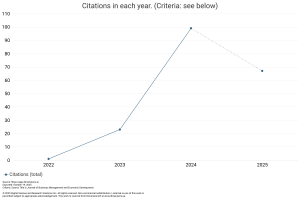Role of Local Culture in Recommendation Intentions through Memorable Tourism Experiences
DOI:
https://doi.org/10.59653/jbmed.v2i01.325Keywords:
local culture, memorable tourism experiences, recommendation intention, heritageAbstract
The main objective of this study is to investigate the effect of local culture on the recommendation intention of tourists who have visited Kebondalem Kidul Cultural Tourism Village, with the mediation of memorable tourism experiences. In this study, a quantitative analysis approach with descriptive analysis was used, using a 5-point Likert scale. The sample collection used a non-probability sampling method, specifically judgment sampling. The sample consisted of 150 respondents who had visited the Kebondalem Kidul Cultural Tourism Village as tourists. Structural Equation Modeling (SEM) SmartPLS 3.2.9 was used as an analytical tool for analysis. Among tourists in Kebondalem Kidul Cultural Tourism Village, local culture directly impacts recommendation intention and memorable tourism experiences. Memorable tourism experiences mediate between local culture and recommendation intention for tourists in the Kebondalem Cultural Tourism Village environment. This research substantially contributes to the existing knowledge regarding local culture in various aspects. The study carries significant practical implications for stakeholders, tourism administrators, and businesses aiming to promote tourism in Kebondalem Kidul Cultural Tourism Village. The findings show that when perceived through memorable tourism experiences, local culture influences tourists' recommendation intention during their trip.
Downloads
References
Ajawaila, J. W. (2003). Aku dalam budaya lokal, budaya nasional, dan budaya global. In Dialog Budaya, Wahana Pelestarian dan Pengembangan Kebudayaan Bangsa (1st ed.). Mitra Sari.
Antón, C., Camarero, C., Laguna, M., & Buhalis, D. (2019). Impacts of authenticity, degree of adaptation and cultural contrast on travellers’ memorable gastronomy experiences. Journal of Hospitality Marketing and Management, 28(7), 743–764. https://doi.org/10.1080/19368623.2019.1564106
Artal-Tur, A., Villena-Navarro, M., & Alamá-Sabater, L. (2018). The relationship between cultural tourist behaviour and destination sustainability. Anatolia, 29(2), 237–251. https://doi.org/10.1080/13032917.2017.1414444
Chandralal, L., & Valenzuela, F.-R. (2015). Memorable Tourism Experiences: Scale Development. Contemporary Management Research, 11(3), 291–310. https://doi.org/10.7903/cmr.13822
Chang, Y. C., Yeh, T. M., Pai, F. Y., & Huang, T. P. (2018). Sport activity for health!! The effects of karate participants’ involvement, perceived value, and leisure benefits on recommendation intention. International Journal of Environmental Research and Public Health, 15(5). https://doi.org/10.3390/ijerph15050953
Chen, C. F., & Tsai, D. C. (2007). How destination image and evaluative factors affect behavioral intentions? Tourism Management, 28(4), 1115–1122. https://doi.org/10.1016/j.tourman.2006.07.007
Chen, X., Cheng, Z. feng, & Kim, G. B. (2020). Make it memorable: Tourism experience, fun, recommendation and revisit intentions of Chinese outbound tourists. Sustainability (Switzerland), 12(5), 1–24. https://doi.org/10.3390/su12051904
Coudounaris, D. N., & Sthapit, E. (2017). Antecedents of memorable tourism experience related to behavioral intentions. Psychology and Marketing, 34(12), 1084–1093. https://doi.org/10.1002/mar.21048
Figueroa, V., Herrero, L. C., Báez, A., & Gómez, M. (2018). Analysing how cultural factors influence the efficiency of tourist destinations in Chile. International Journal of Tourism Research, 20(1), 11–24. https://doi.org/10.1002/jtr.2149
Ghozali, I. (2021). Partial Least Square Konsep, Teknik dan Aplikasi menggunakan Program SmartPLS 3.2.9 Untuk Penelitian Empiris (3 rd Ed.). Badan Penerbit Universitas Diponegoro.
Ghozali I. (2021). Partial Least Square Konsep, Teknik dan Aplikasi menggunakan Program SmartPLS 3.2.9 Untuk Penelitian Empiris (Edisi 3). Badan Penerbit Universitas Diponegoro.
Kim, J.-H. (2018). The Impact of Memorable Tourism Experiences on Loyalty Behaviors: The Mediating Effects of Destination Image and Satisfaction. Journal of Travel Research, 57(7), 856–870. https://doi.org/10.1177/0047287517721369
Kim, J.-H., & Ritchie, J. R. B. (2014). Cross-Cultural Validation of a Memorable Tourism Experience Scale (MTES). Journal of Travel Research, 53(3), 323–335. https://doi.org/10.1177/0047287513496468
Kim, J. H. (2014). The antecedents of memorable tourism experiences: The development of a scale to measure the destination attributes associated with memorable experiences. Tourism Management, 44, 34–45. https://doi.org/10.1016/j.tourman.2014.02.007
Lončarić, D., Prodan, M. P., & Dlačić, J. (2021). Memorable tourism experiences inspired by the beauty of nature. Tourism and Hospitality Management, 27(2), 315–337. https://doi.org/10.20867/THM.27.2.5
Monika, B., Thamaraiselvan, N., & Sivanesan, G. (2021). Examining Memorable Tourism Experience On Memorable Trip Experience, Subjective Well-Being And Revisit Intention. Journal of Contemporary Issues in Business and Government, 27(03). https://doi.org/10.47750/cibg.2021.27.03.036
Naqvi, M. H. A., Jiang, Y., Naqvi, M. H., Miao, M., Liang, C., & Mehmood, S. (2018). The effect of cultural heritage tourism on tourist word of mouth: The case of Lok Versa Festival, Pakistan. Sustainability (Switzerland), 10(7). https://doi.org/10.3390/su10072391
Pine B., J., & James H., G. (1998). Welcome to the Experience Economy. Harvard Business Review, 76(4), 97–105.
Quynh, N. H., Hoai, N. T., & Loi, N. Van. (2021). The role of emotional experience and destination image on ecotourism satisfaction. Spanish Journal of Marketing - ESIC, 25(2), 312–332. https://doi.org/10.1108/SJME-04-2020-0055
Rasoolimanesh, S. M., Seyfi, S., Rather, R. A., & Hall, C. M. (2022). Investigating the mediating role of visitor satisfaction in the relationship between memorable tourism experiences and behavioral intentions in heritage tourism context. Tourism Review, 77(2), 687–709. https://doi.org/10.1108/TR-02-2021-0086
Sekaran, U., & Bougie, R. (2016). Research Methods for Business: A Skill-Building Approach. In Leadership & Organization Development Journal (Seventh ed, Vol. 34, Issue 7). John Wiley & Sons Ltd. https://doi.org/10.1108/lodj-06-2013-0079
Sharma, P., & Nayak, J. K. (2019). Understanding memorable tourism experiences as the determinants of tourists’ behaviour. In International Journal of Tourism Research (Vol. 21, Issue 4, pp. 504–518). John Wiley and Sons Ltd. https://doi.org/10.1002/jtr.2278
Stamboulis, Y., & Skayannis, P. (2003). Innovation strategies and technology for experience-based tourism. Tourism Management, 24(1), 35–43. https://doi.org/10.1016/S0261-5177(02)00047-X
Sthapit, E. (2013). Tourists’ perceptions of memorable experiences: Testing the memorable tourism experience scale (MTEs) among tourists to Rovaniemi, Lapland [Master’s thesis, fi= Lapin yliopisto| en= University of Lapland|]. https://lauda.ulapland.fi/handle/10024/61343
Su, M. M., & Wall, G. (2015). Exploring the Shared Use of World Heritage Sites: Residents and Domestic Tourists’ Use and Perceptions of the Summer Palace in Beijing. International Journal of Tourism Research, 17(6), 591–601. https://doi.org/10.1002/jtr.2026
Sugandini, D., Istanto, Y., Puspitasari, Y. A., & Rahmawati, E. D. (2019). Loyalitas Wisata pada Destinasi Wisata Heritage dan Hasil Riset Empiris (R. I. Utami (ed.)). Penerbit ANDI.
Tsai, C.-T. S. (2016). Memorable Tourist Experiences and Place Attachment When Consuming Local Food. International Journal of Tourism Research, 18(6), 536–548. https://doi.org/10.1002/jtr.2070
Vada, S., Prentice, C., Filep, S., & King, B. (2022). The influence of travel companionships on memorable tourism experiences, well-being, and behavioural intentions. International Journal of Tourism Research, 24(5), 714–724. https://doi.org/10.1002/jtr.2533
Voss, C., Roth, A. V., & Chase, R. B. (2008). Experience, service operations strategy, and services as destinations: Foundations and exploratory investigation. Production and Operations Management, 17(3), 247–266. https://doi.org/10.3401/poms.1080.0030
W. Litvin, S., E. Goldsmith, R., & Pan, B. (2008). ELECTRONIC WORD-OF-MOUTH IN HOSPITALITY AND TOURISM MANAGEMENT. Tourism Management, 29 (3), 458–468.
Xu, L., Zhang, J., & Nie, Z. (2022). Role of Cultural Tendency and Involvement in Heritage Tourism Experience: Developing a Cultural Tourism Tendency–Involvement–Experience (TIE) Model. Land, 11(3). https://doi.org/10.3390/land11030370
Yu, C. P., Chang, W. C., & Ramanpong, J. (2019). Assessing visitors’ memorable tourism experiences (MTEs) in forest recreation destination: A case study in Xitou Nature Education Area. Forests, 10(8), 1–16. https://doi.org/10.3390/f10080636
Downloads
Published
How to Cite
Issue
Section
License
Copyright (c) 2023 Indra Iryanto Nur Hidayat, Wisnalmawati Wisnalmawati, Dyah Sugandini

This work is licensed under a Creative Commons Attribution-ShareAlike 4.0 International License.
Authors who publish with this journal agree to the following terms:
- Authors retain copyright and grant the journal right of first publication with the work simultaneously licensed under a Creative Commons Attribution-ShareAlike that allows others to share the work with an acknowledgement of the work's authorship and initial publication in this journal.
- Authors are able to enter into separate, additional contractual arrangements for the non-exclusive distribution of the journal's published version of the work (e.g., post it to an institutional repository or publish it in a book), with an acknowledgement of its initial publication in this journal.
- Authors are permitted and encouraged to post their work online (e.g., in institutional repositories or on their website) prior to and during the submission process, as it can lead to productive exchanges, as well as earlier and greater citation of published work (See The Effect of Open Access).





























